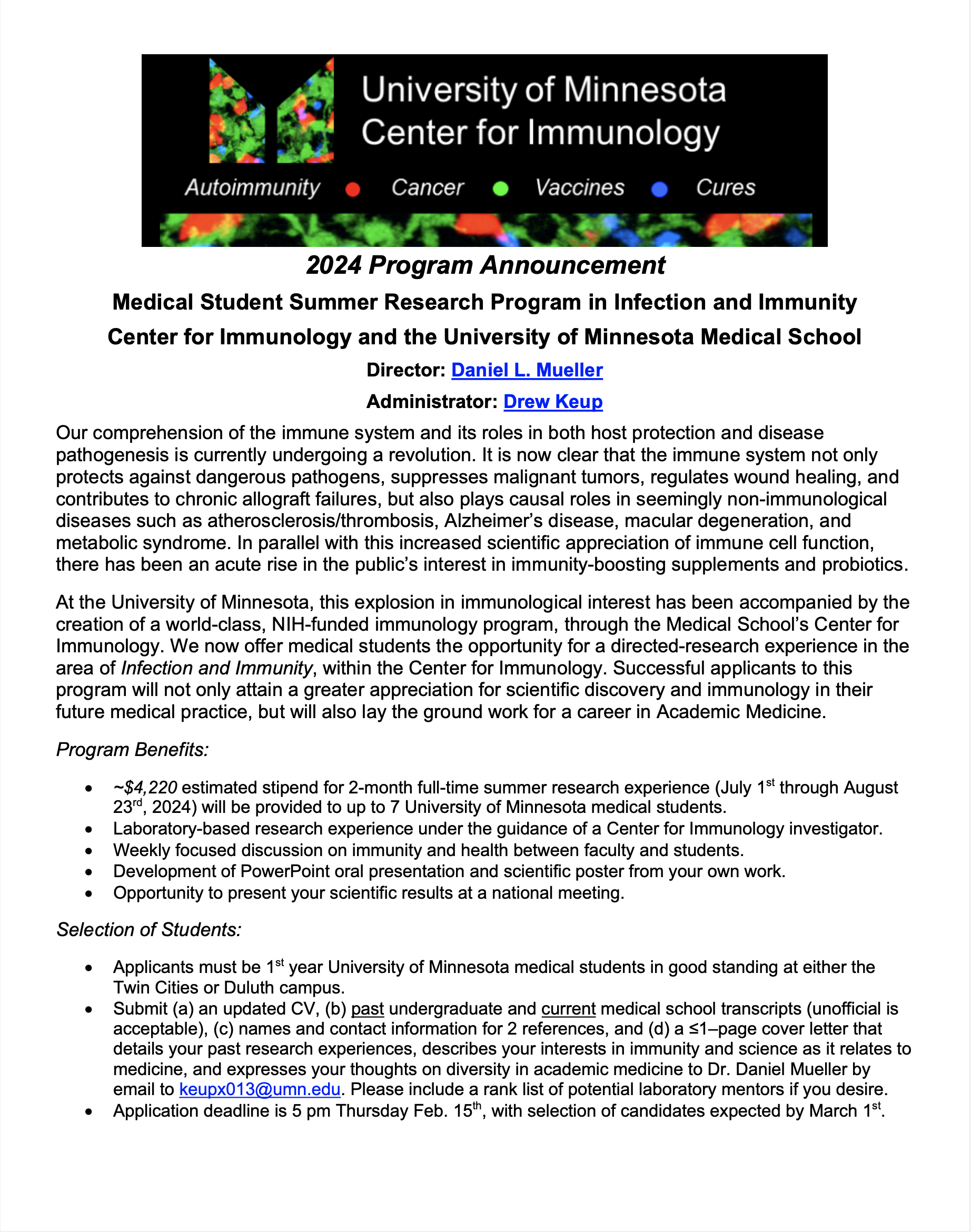2024 Medical Student Summer Research
2024 Medical Student Summer Research Program in Infection and Immunity
Director: Daniel L. Mueller
Administrator: Drew Keup Email about the program
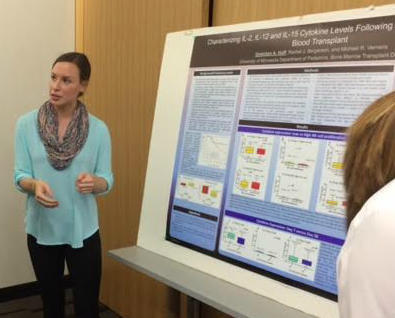
Our comprehension of the immune system and its roles in both host protection and disease pathogenesis is currently undergoing a revolution. It is now clear that the immune system not only protects against dangerous pathogens, suppresses malignant tumors, regulates wound healing, and contributes to chronic allograft failures, but also plays causal roles in seemingly non-immunological diseases such as atherosclerosis/thrombosis, Alzheimer’s disease, macular degeneration, and metabolic syndrome. In parallel with this increased scientific appreciation of immune cell function, there has been an acute rise in the public’s interest in immunity-boosting supplements and probiotics.
At the University of Minnesota, this explosion in immunological interest has been accompanied by the creation of a world-class, NIH-funded immunology program, through the Medical School’s Center for Immunology. We now offer medical students the opportunity for a directed-research experience in the area of Infection and Immunity, within the Center for Immunology. Successful applicants to this program will not only attain a greater appreciation for scientific discovery and immunology in their future medical practice, but will also lay the ground work for a career in Academic Medicine.
Program benefits
- $4,220 estimated stipend for 2-month full-time summer research experience (July 1st through August 23rd, 2024) will be provided to up to 7 University of Minnesota medical students.
- Laboratory-based research experience under the guidance of a Center for Immunology investigator.
- Weekly focused discussion on immunity and health between faculty and students.
- Development of research poster and PowerPoint presentation from your own work.
- Opportunity to present your scientific results at a national meeting.
Selection of students
- Applicants must be 1st year University of Minnesota medical students in good standing at either the Twin Cities or Duluth campus.
- Submit
(a) an updated CV
(b) past undergraduate and current medical school transcripts (unofficial is acceptable)
(c) names and contact information of 2 references, and
(d) a ≤ 1–page cover letter that details your past research experiences, describes your interests in immunity and science as it relates to medicine, and expresses your commitment to diversity in academic medicine to Dr. Daniel Mueller by email at. Please include a rank list of potential laboratory mentors if you desire.
- Application deadline is 5:00 p.m. Thursday, Feb. 15, 2024, with a selection of candidates expected by March 1, 2024.
NIH T35 Medical Student Summer Research Program in Infection and Immunity 2024 Preceptors
Craig Bierle, Assistant Professor, Pediatrics
Bryce Binstadt, Professor, Pediatrics
Bruce Blazar, Professor, Pediatrics
Paul Bohjanen, Professor, Microbiology and Immunology
Tyler Bold, Assistant Professor of Medicine
David Boulware, Professor, Medicine
Christina Camell, Assistant Professor of Biochemistry, Molecular Biology, and Biophysics
Frank Cichocki, Assistant Professor of Medicine
Michael Farrar, Professor, Laboratory Medicine & Pathology
Brian Fife, Professor, Medicine
Tanya Freedman, Associate Professor, Pharmacology
Thomas Griffith, Professor, Urology
Sara Hamilton Hart, Associate Professor, Laboratory Medicine & Pathology
Geoffrey Hart, Assistant Professor, Medicine
Kristin Hogquist, Professor, Laboratory Medicine & Pathology
Stephen Jameson, Professor, Laboratory Medicine & Pathology
Marc Jenkins, Professor, Microbiology and Immunology
Alexander Khoruts, Professor, Medicine
Do-Hyung Kim, Professor of Biochemistry, Molecular Biology, and Biophysics
Ryan Langlois, Professor, Microbiology and Immunology
David Masopust, Professor, Microbiology and Immunology
Jeffery Miller, Professor, Medicine
Daniel Mueller, Professor of Medicine
Kirsten Nielsen, Professor, Microbiology & Immunology
Angela Panoskaltsis-Mortari, Professor, Pediatrics
Erik Peterson, Associate Professor, Medicine
Xavier Revelo, Associate Professor of Integrative Biology & Physiology
Hai-Bin Ruan, Associate Professor of Integrative Biology and Physiology
Mark Schleiss, Professor, Pediatrics
Kaylee Schwertfeger, Professor, Laboratory Medicine & Pathology
Sabrina Scroggins, Assistant Professor, Biomedical Sciences
Yoji Shimizu, Professor, Laboratory Medicine & Pathology
Ingunn Stromnes, Associate Professor, Microbiology and Immunology
Vaiva Vezys, Associate Professor, Microbiology and Immunology
Chun Wang, Associate Professor, Biomedical Engineering
Carston Wagner, Professor, Medicinal Chemistry
Bruce Walcheck, Professor, Veterinary and Biomedical Sciences
Jesse W. Williams, Assistant Professor of Integrative Biology & Physiology
Preceptor Research
More information here
NIH T35 Medical Student Summer Research Program in Infection and Immunity 2024 Preceptors
Craig J. Bierle, PhD, is an Assistant Professor in the Division of Pediatric Infectious Diseases and leads a research laboratory that studies how viral infection during pregnancy affects placental development and function. The Bierle Lab draws on expertise in molecular virology, reproductive immunology, and placental biology to study the pathogenesis of cytomegalovirus and other significant causes of congenital infection.
Bryce Binstadt, MD, PhD, Professor of Pediatrics, is a practicing pediatric rheumatologist whose lab is broadly focused on autoimmunity. He is investigating the drivers of cardiovascular inflammation in systemic autoimmune diseases and the role of dual TCR T cells in autoimmunity. His long-term goal is to identify therapeutically targetable pathways to reduce cardiovascular morbidity and mortality among patients with rheumatoid arthritis, SLE, and related diseases.
Bruce Blazar, MD, Regents’ Professor of Pediatrics, is a practicing Pediatric Hematologist/Oncologist with expertise in blood and bone marrow transplantation. His laboratory is broadly focused on the control of T cell responses to cancer, with specific interest in graft vs. host disease and graft vs. leukemia effect, as well as post-transplant immunity. He is T-cellalso investigating the derivation of human T regulatory cells.
Paul Bohjanen, MD, PhD, Professor of Medicine, is a practicing Infectious Diseases physician and the Director of the Division of Infectious Diseases and International Medicine. He has a long-standing interest in the mechanisms by which RNA-binding proteins regulate T cell responses. He is also actively investigating the HIV immune reconstitution inflammatory syndrome in HIV/AIDS patients who receive antiretroviral therapy in Africa.
Tyler Bold, MD, PhD, Assistant Professor of Medicine, is a physician-scientist, trained in the clinical subspecialty practice of infectious diseases, and laboratory-based investigations of microbiology and immunology. His clinical interests regard the care of immune-compromised patients being treated for cancer or undergoing transplantation. His lab in the Center for Immunology is focused on advancing the understanding of how the adaptive immune system combats infection with Mycobacterium tuberculosis, the bacterial pathogen responsible for human TB.
David Boulware, MD, Professor of Medicine, combines his clinical research with nested basic science investigations into disease pathogenesis to conduct translational research. His primary research interests are in meningitis in resource-limited areas including diagnosis, prevention, treatment, and quality improvement initiatives incorporating cost-effectiveness analyses to translate knowledge into improved care.
Christina Camell, PhD, Assistant Professor of Biochemistry, Molecular Biology, and Biophysics, research is focused on the biology of aging. The Camell lab is studying the cellular and molecular changes within tissue-resident immune cells that drive metabolic impairments in tissues. In particular, they are focused on lipolysis, a metabolic process that is required for the release of energetic substrates from stored triglycerides in adipocytes.
Frank Cichocki , PhD, Associate Professor of Medicine, carries out work focused on the molecular mechanisms controlling the differentiation, expansion, signaling, and function of unique, heterogeneous subsets of adaptive NK cells that arise in response to cytomegalovirus (CMV) infection in healthy individuals and CMV reactivation in hematopoietic cell transplant (HCT) recipients.
Michael Farrar, PhD, Professor of Laboratory Medicine & Pathology, seeks to understand how cytokine signaling pathways govern lymphocyte development and function, and how deregulation of these pathways can lead to cancer. His lab’s current focus is on IL2R/TCR/TNF signaling in Treg development, Jak/STAT5 signaling pathway in B cell development and B cell leukemia, and CD4+ T cell responses to BCR-ABL+ B cell leukemia.
Brian Fife, PhD, Professor of Medicine, is focused on the identification of autoreactive T cells that are responsible for type 1 diabetes, as well as the mechanisms that we can exploit to re-establish immunological tolerance as a therapy. He is the Director of our 2-photon imaging core facility and uses this technology heavily in his research.
Tanya Freedman, PhD, Associate Professor of Pharmacology, studies how regulation of the Src family kinases, especially LynA, regulate the receptor-ligand size threshold that sometimes results in macrophage hypersensitivity to smaller stimuli. She is also interested in how LynA and other signaling proteins contribute to macrophage roles in autoinflammation, tumor growth, and antimicrobial responses.
Thomas Griffith, PhD, Professor of Urology, is investigating the immunosuppression that occurs following septicemia. He also studies immune cell-derived tumor necrosis family members for their ability to control cancer cells.
Sara Hamilton Hart, PhD, Associate Professor of Laboratory Medicine & Pathology, is focusing her research on CD8+ T cells with the goal of learning how to manipulate them to elicit the optimal protective immune response to pathogen infection.
Geoffrey Hart, PhD, Assistant Professor of Medicine, uses a basic immunology approach to study protection against malaria species in endemic regions of Africa. He seeks to understand the protective and pathological mechanisms of this disease with the belief that unanswered questions lie where innate immunity intersects with the adaptive immune system.
Geoffrey Hart, PhD, Assistant Professor of Medicine, uses a basic immunology approach to study protection against malaria species in endemic regions of Africa. He seeks to understand protective and pathological mechanisms of this disease with the belief that unanswered questions lie where innate immunity intersects with the adaptive immune system.
Kristin Hogquist, PhD, Professor of Laboratory Medicine & Pathology, has a long-standing interest in T cell development. Her group studies how selection processes shape the T cell repertoire to achieve a highly effective and self-tolerant adaptive immune system. Their current research is focused on three areas: positive and negative selection in the thymus, iNKT cell development, and the human T cell response to EBV.
Stephen Jameson, PhD, Professor of Laboratory Medicine & Pathology, is focused on CD8+ T cell activation, homeostasis, and memory. Current work is exploring which memory CD8+ T cell subsets provide the best protection against pathogens, what the role of KLF2 is in resident memory cells, and how homeostatic mechanisms drive naïve CD8+ T cells to acquire memory T cell characteristics and what the significance of such cells in host defense is.
Marc Jenkins, PhD, Regents Professor of Microbiology and Immunology, studies how antigen-specific helper T cells and B cells are activated in the body. Their work seeks to understand the interactions between T cells, dendritic cells, and B cells that lead to effective immune memory and self-tolerance. By studying the activation of antigen-specific lymphocytes in the body, Jenkins hopes to gain information that can be used to improve vaccines and inhibit deleterious immune responses such as autoimmunity.
Alexander Khoruts, MD, Professor of Medicine, is a practicing gastroenterologist and immunologist. His lab investigates host-microbe interactions and is doing translational work involving microbiota therapeutics. His group was the first to demonstrate successful fecal microbiota transplantation (FMT) for the treatment of patients with Clostridium difficile infection, and they are currently exploring the effects of gut microbiota on bile acid metabolism and immune-mediated colonization resistance in the gut.
Do-Hyung Kim, PhD, Professor of Biochemistry, Molecular Biology, and Biophysics, is interested in understanding the molecular networks that coordinate nutrient metabolism and cell growth. How do cells assess nutrient- or energy states and relay this information into appropriate decisions on growth? Coordinate regulation of nutrient metabolism and cell growth is of fundamental importance, and many human diseases, such as cancer, diabetes, and developmental disorders, are affected by alterations in this process.
Ryan A. Langlois, PhD, Professor of Microbiology and Immunology, addresses fundamental questions in virology and viral immunology that have been difficult to dissect using conventional approaches in the Influenza A Virus (IAV). Utilizing host-derived microRNAs, small non-coding RNA capable of mediating silencing of mRNA, to restrict the natural tropism of IAV allows for previously unavailable insights into immune responses to the virus.
David Masopust, PhD, Professor of Microbiology and Immunology, studies the CD8 T cell response to viral and bacterial infections. In particular, he is interested in the memory T cells that reside within respiratory, intestinal, and reproductive mucosa--the common portals of pathogen entry. He mainly uses mouse models to understand T cell migration to different anatomical locations, commitment to the memory lineage, and how these contribute to protection, although findings are being applied to primate models of SIV infection.
Jeffrey Miller, MD, Professor of Medicine, is focused on Natural Killer (NK) Cell Development with the goal to develop NK-cell based immunotherapies to treat cancer without the morbidity of CMV infection. He also studies targeted immunotherapy to treat human cancer, testing novel strategies to activate NK cells in vivo (using novel proteins such as interleukin-15) and to create antigen-specific NK cells with Bispecific Killer Engagers (BiKEs).
Daniel Mueller, MD, Professor of Medicine, is a practicing adult rheumatologist interested in CD4+ T cell anergy, a natural self-tolerance mechanism that prevents autoimmunity. His lab is currently examining the mechanisms by which Foxp3+ regulatory T cells control anergy induction during self-antigen recognition, and the molecular mechanisms that control the differentiation of anergic CD4 T cells to a Foxp3+ regulatory phenotype. He also investigates the role of B cells in rheumatoid arthritis pathogenesis.
Kirsten Nielsen, PhD, Professor of Microbiology and Immunology, focuses on understanding how Cryptococcus causes disease, with the goal of developing better treatment strategies that improve patient survival.
Angela Panoskaltsis-Mortari, PhD, Vice Chair for Research and Professor of Pediatrics focuses on bioengineering the lung using adult stem cells and decellularized whole lung scaffolds to create autologous lungs for transplant. She is also exploring methods of enhancing proper lung repair in several lung injury models using mesenchymal stromal cells, anti-fibrotic interventions, and novel antioxidants.
Erik Peterson, MD, Associate Professor of Medicine, is a practicing rheumatologist, whose research interest is in the molecular and cellular bases for human autoimmune disease. Currently, he is focused on the role of PTPN22, a potent risk allele for rheumatoid arthritis, lupus, and type 1 diabetes. He discovered that PTPN22 selectively regulates type 1 IFN production in myeloid cells and is exploring the mechanism of action and role in pathogenesis.
Xavier Revelo, PhD, Associate Professor of Integrative Biology & Physiology has a broad background in physiology, immunology, and metabolism and expertise in inflammation during cardio-metabolic disease. His research explores the role of the immune system and inflammation in the pathophysiology of obesity-related diseases such as fatty liver disease and heart failure.
Hai-Bin Ruan, PhD, Associate Professor of Integrative Biology and Physiology, conducts an integrated program in the following directions on tissue adaptation and remodeling upon metabolic stress: (1) protein O-GlcNAcylation in physiology and disease, (2) adipose Biology remodeling and energy balance, (3) intestinal epithelium at the interface between gut microbes and host physiology, and (4) immune homeostasis and its regulation of systemic metabolism.
Mark R. Schleiss, MD, Professor of Pediatrics, is engaged in the study of congenital cytomegalovirus (CMV) infection vaccines, immunopathogenesis, and placental infection. Using a variety of vaccine strategies, including purified protein subunit and DNA vaccines, his lab is evaluating the extent of protection of the maternal-placental-fetal unit against CMV infection and disease, using animal models of infection.
Kaylee Schwertfeger, PhD, Professor of Laboratory Medicine & Pathology, is focused on the breast cancer microenvironment and how breast cancer cells interact with cells in the stroma, particularly with immune cells. The cell of particular interest to her group is the macrophage. Schwertfeger’s laboratory is also exploring how breast cancer cells interact with osteoclasts to promote bone metastasis using the FGFR signaling pathway to see whether the FGFR pathway inhibitors can be used to inhibit breast cancer metastasis.
Sabrina Scroggins, PhD, Assistant Professor of Biomedical Sciences, investigates the intersections between the worlds of perinatal biology and cellular immunology to identify and understand underlying mechanisms that contribute to the development of maternal diseases. Current work focuses on identifying and developing novel, personalized cellular immunotherapy approaches to treat and prevent hypertensive diseases in pregnancy.
Yoji Shimizu, PhD, MSTP Program Director and Professor of Laboratory Medicine & Pathology, has a research interest in lymphocyte adhesion and migration, and how these mechanisms contribute to effective immunity to pathogens and tumors. The long-term objective of his work is to provide the knowledge base necessary to specifically modulate the immune response by targeting these mechanisms of cell adhesion and migration.
Ingunn Stromnes, PhD, Associate Professor of Microbiology and Immunology, is focused on advancing the understanding of cancer immunology and immunotherapy, with a particular emphasis on properties of the tumor and the tumor microenvironment that influence antigen-specific T lymphocyte migration and function.
Vaiva Vezys, PhD, Associate Professor of Microbiology and Immunology, studies T cell responses in autoimmunity and chronic infection. She is currently investigating what maintains the population of memory T cells specific for persistent pathogens, such as polyoma and lymphocytic choriomeningitis viruses. In addition, her group studies how tolerance is induced and maintained to intestinal proteins, as breakdown of this can lead to diseases such as ulcerative colitis and Crohn’s disease.
Carston R. Wagner, PhD, Professor of Medicinal Chemistry, seeks to apply the principles of organic chemistry, enzymology analytical chemistry, molecular & cellular biology, biophysics and nanotechnology to the development of new methods for drug design and delivery, chemically engineered cellular therapies, and tissue engineering.
Bruce Walcheck, PhD, Professor of Veterinary and Biomedical Sciences, is examining various aspects of inflammation regulation. His lab is actively involved in understanding the function and regulation of this proteolytic process to manipulate inflammation and bolster innate immunity or diminish damaging inflammation.
Chun Wang, PhD, Associate Professor of Biomedical Engineering, is interested in exploring how to engineer polymers so we can build biomaterials to use to solve problems in biology and medicine. The long-term goal is to develop implantable multifunctional biomaterials that serve as synthetic cell niches, capable of integrating instructive molecular signals for promoting recruitment, retention, survival, proliferation, and differentiation of stem/progenitor cells, ultimately leading to significant improvement of the clinical outcome of cell therapy.
Jesse W. Williams, PhD, Assistant Professor of Integrative Biology & Physiology investigates monocyte trafficking and macrophage heterogeneity in cardiovascular disease. His group primarily uses mouse models of atherosclerosis to reveal mechanisms that regulate macrophage activity toward inflammatory or pro-resolving phenotypes. In addition, he has interests in studying modifiers of cardiovascular disease and has current grant objectives to examine the influence of the innate immune system on acute and chronic stress responses.
For more information Email Dr. Mueller about the program
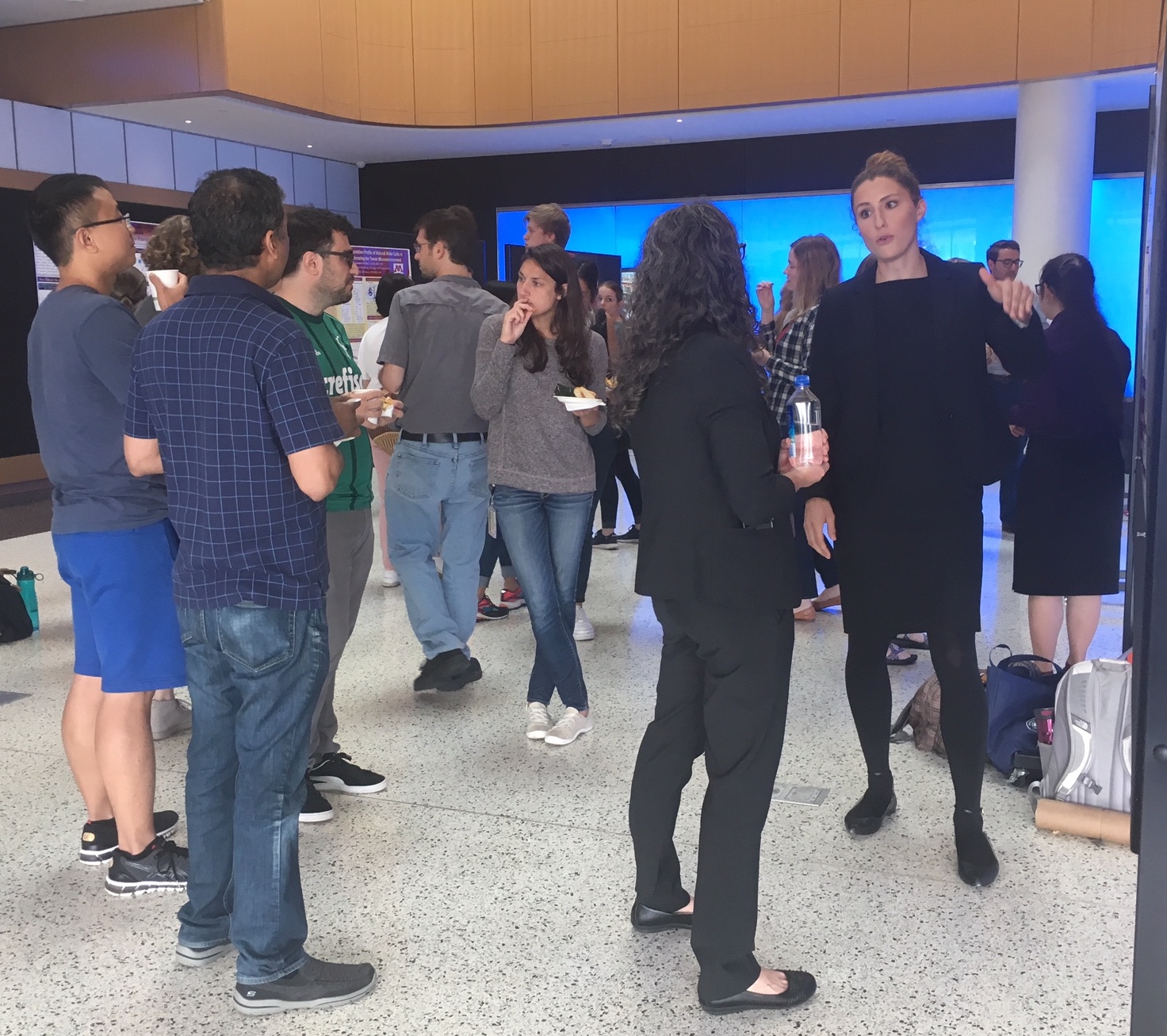
2019 Poster Session
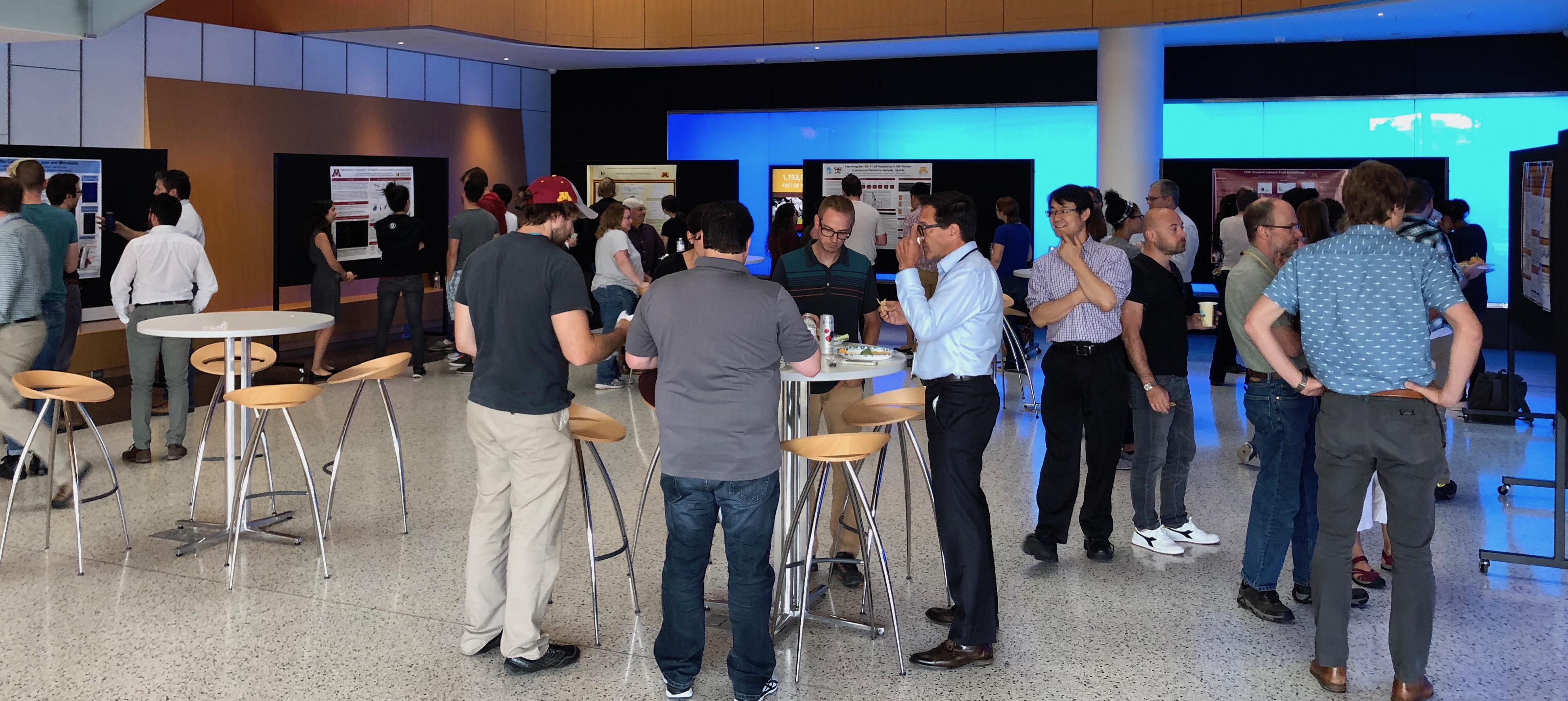
2018 Poster Session
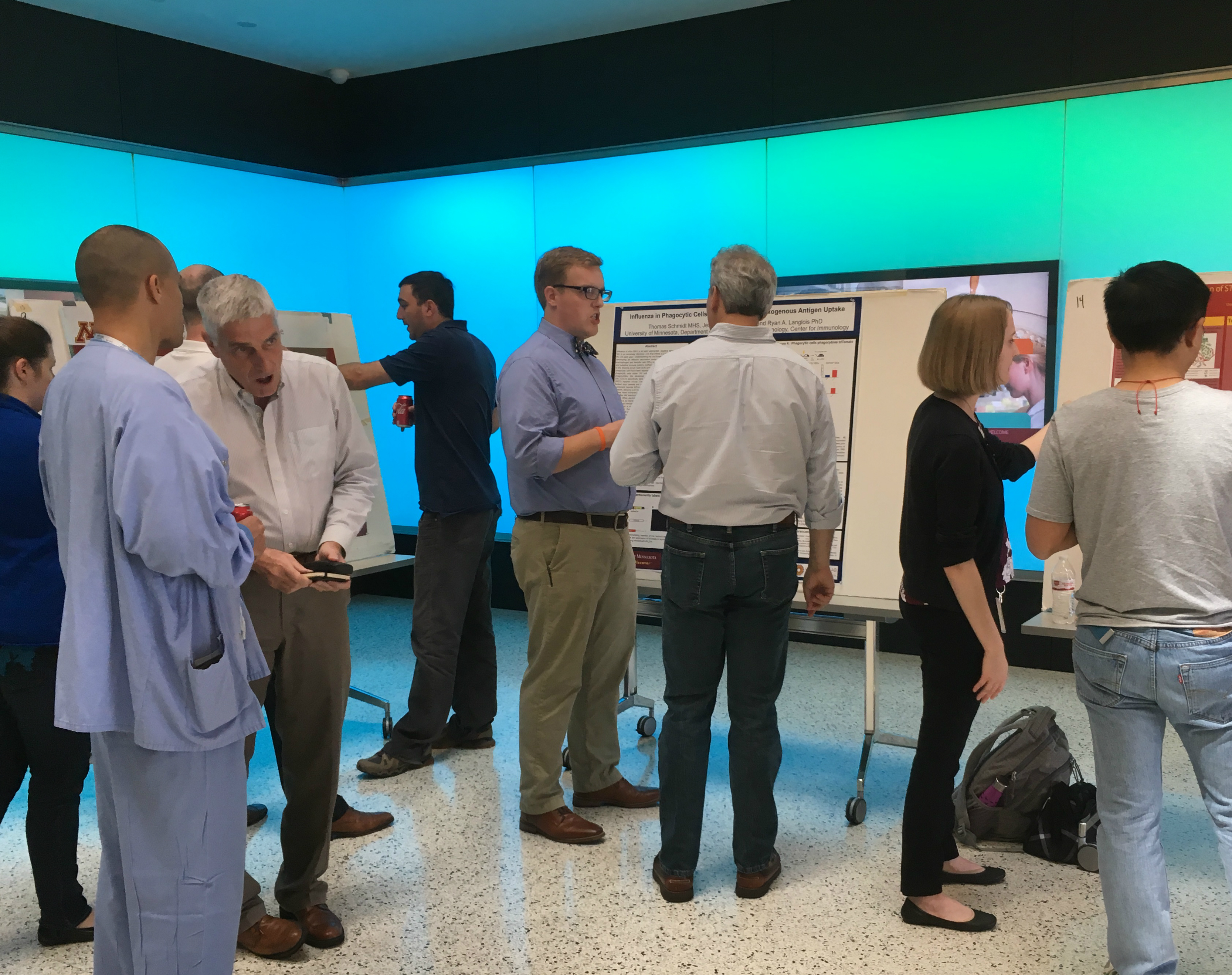
2017 Poster Session
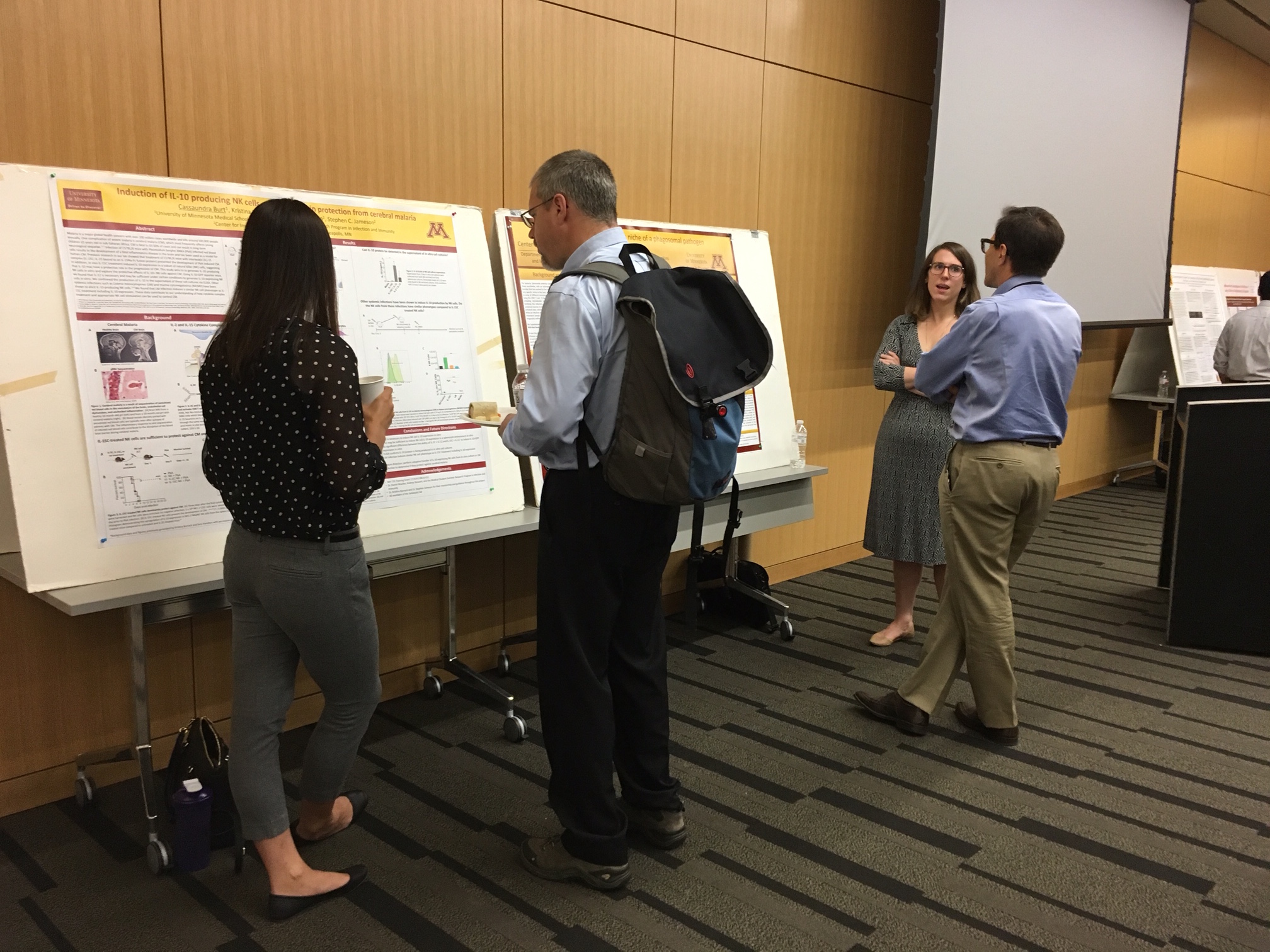
2016 Poster Session
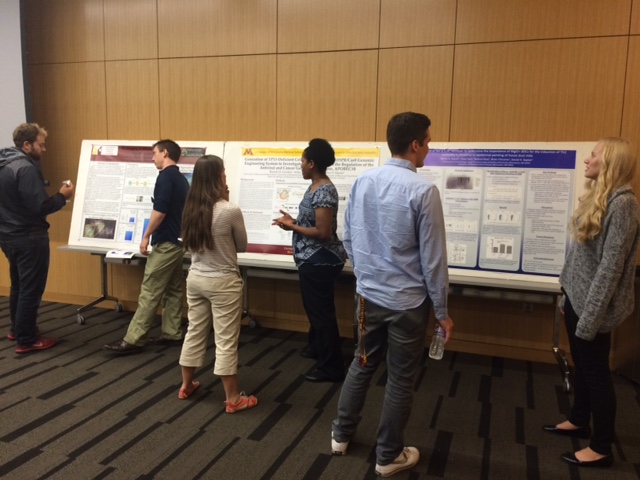
2015 Poster Session
